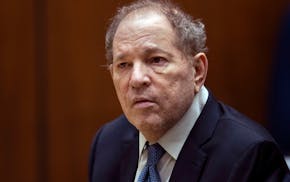Becky Rose's friend came to her to unload a jumble of feelings — chief among them, anguish and anger: Her marriage was breaking up after her husband abruptly announced he wanted out.
"My natural impulse would have been to tell her, 'You're better off without him,' to join her in dumping on him," said Rose. But "I stayed in the gray zone. I said, 'This is really painful. What can I do?' "
Rose, a 65-year-old St. Paulite who's been married for more than 40 years, was following an approach she learned through Marital First Responders. The program is for friends, family members and co-workers of people who are struggling in their marriages. Created by Bill Doherty, a longtime family social science professor at the University of Minnesota, it's not intended to supplant professional counseling, but to quickly offer a confidant.
"From research, we know that people turn first to those they know and trust," said Doherty. As a licensed marriage counselor who also trains other marriage counselors, he very much believes in what professionals can do. The problem is that most couples wait too long to seek help.
"They only go to marriage counseling when they're in a lot of trouble, when it's probably too late," he said. "With marriage counseling, both people have to agree. Marital First Responders are one-to-one, you don't have to get the spouse on board. Someone in a painful marriage values a confidant to help them sort out their relationship."
Responders aren't intended to deal with what Doherty calls "hard problems," such as toxic marriages plagued by abuse, addiction and affairs.
"But most divorces happen today because of what we call 'soft problems,' " he said. "That's money conflicts, growing apart, incompatibility, the sex isn't any good anymore. There's hope for these couples to work it out, if they can be steered back to what brought them together in the first place."
Good listeners
While you'd think that this kind of training might appeal to buttinskis, Doherty insists that's not the case.
"I found that people who will spend a day of their lives learning to be more helpful are not the ones who stick their noses into other people's business," he said. "The busybodies don't take the class — they think they already know what to do."
In fact, the volunteers who are drawn to the Marital First Responders workshops tend to be those to whom others naturally turn.
"We teach them to listen empathetically, observe boundaries and be cautious with advice," Doherty said. "I tell them, let the person talk and listen for feelings. Don't interrupt, don't come in with your perspective too soon, don't start telling your own story."
So far, about 500 people have completed the First Responders training, including many members of Unity Unitarian Church in St. Paul.
"The path of marriage is hard and demanding. I say, marriage is hell and you earn heaven though hard work," said the Rev. Janne Eller-Isaacs, who co-leads the congregation with her husband.
She said that couples of many backgrounds often take faith-based premarital counseling and that many worship communities offer divorce support groups. But she sees a gap in resources that support a congregation's couples in going the distance.
"In our fix-it culture, we are not well schooled in disappointment," she said. "This is peer-to-peer: 'I've been there, I know it's hard, I'm not here to judge.' "
Tailored to fit
The curriculum used by Marriage First Responders has been in use for a few years. Recently, though, it has expanded to serve specific communities.
Corey Yeager, who is working on a doctorate at the University of Minnesota, is adapting the responder training to be responsive to the specific needs of African-American couples.
"In our community, we don't go to therapy at the rate that other groups do; there's a low level of trust in engaging in the system," he said. The First Responders model, however, is a better fit.
"It's already happening," he said. "Wise people stepping up to listen and advise is a tradition. We can equip them with tools so they can do it better when someone comes to them with problems."
The program also is being adapted for the LGBT community, said Kyle Zrenchik, a licensed family and marriage counselor who is completing a doctorate at the university. He has worked with Doherty to adapt the training.
"This LGBT version gives us the chance to champion marriage beyond the weddings," he said.
"Now that we have the right, we have to support and strengthen these marriages in our community," he said.
His adaptation acknowledges that LGBT couples have to navigate tricky issues that straight couples don't face; for example, problems with family acceptance of the relationship are more prevalent.
Zrenchik has used his curriculum to train both gay and straight responders, with the goal of making them more confident, knowledgable and skillful when they are sought out as confidants.
Tisa Thomas, 30, is not gay but has many LGBT friends and relatives. She embraced the training to be a more perceptive ally.
"I have common sense, my personality is nonjudgmental and I'm OK with people unloading on me, so I've always been the person that people talk to," she said. "I've learned to listen differently, more deeply."
Doherty, who has been married for 44 years, is a champion of the institution, as are the people he has trained as Marital First Responders. But even he understands that not every problem in a marriage can — or even should — be solved.
"It [marriage] is the core relationship of adult life," he said. "But all couples have conflict and there's nothing wrong with it. I'd say 70 percent of ongoing marital problems never get solved, but couples can learn to live with them more graciously."
Kevyn Burger is a Minneapolis-based freelancer and broadcaster.
